7 TikTok Spark Ad Examples with Influencers & TikTok UGC
What do the best TikTok Spark Ads have in common? Below we share seven Spark Ad examples highlighting how TikTok UGC translates into awesome brand...
Is advertising on TikTok worth it? Fair question! Below we dig into the proven pros, potential cons and everything else brands should know about TikTok ads.
%20(1).jpg)
.jpg?width=800&name=advertising%20on%20tiktok%20cover%20sized%20(1).jpg)
"Is advertising on TikTok worth it? Should we ramp things up? Scale back?"
If you're second-guessing all of the above, you're not alone.
Budgets are tightening and brands need to justify their social ad spend with confidence.
The thing is, TikTok has 100% lived up to the "hype" when it comes to paid advertising.
Rollouts such as Spark Ads and Shop are driving billions of dollars in consistent ad revenue YoY. TikTok's ad platform and features have advanced to rival those of Meta for ecommerce.
Translation? TikTok advertising isn't the wild West anymore.
From influencer campaigns to sponsored videos, TikTok advertising offers brands creative freedom with proven results. Still, success with TikTok ads doesn't happen by accident.
Below we break down the pros and cons of TikTok advertising to decide if it's worth it!
Skip to Section👇 |
To kick things off, let’s look at the big-picture positives of running TikTok ads.
TikTok’s mantra of “Make TikToks, not ads” is central to successful ads on the app.
Because the best TikTok ads resemble organic content (hint: “real” videos).
Many types of TikTok ads are designed to help brands produce ads that don't feel like ads at all.
This is exactly what TikTok Spark Ads are designed to do. The the process of whitelisting on TikTok, you can seamlessly transform organic posts into sponsored content.
Doing so injects a much-needed sense of authenticity into your TikTok advertising strategy. If a post performs well organically, chances are it has the potential to pop off as a TikTok ad.
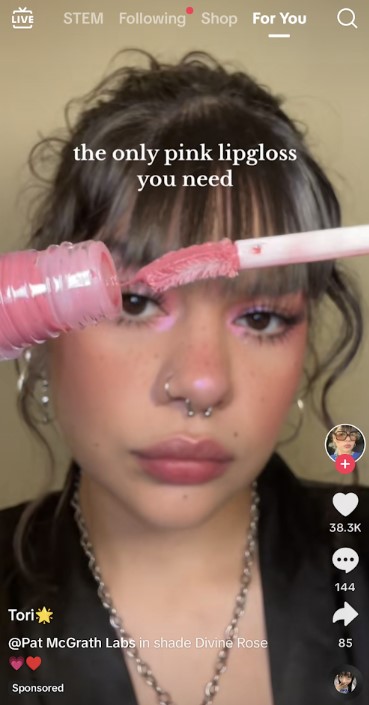
The platform empowers brands to create the least “salesy” ads possible. That's why raw and organic content is perfect for TikTok ads.
Oh, and the best part? Creative freedom doesn’t mean sacrificing performance.
Research from TikTok themselves notes that creator-based Spark Ads boost ad engagement in a big way. This includes longer watch times, more conversions and greater brand recall.
If you've struggled with seeing results with TikTok advertising in the past, we recommend building on your strategy on Spark Ads vs. non-Spark ads.
The presentation of the biggest advantages of TikTok advertising.
Rather than interrupt users, TikTok ads are presented on the “Following” or “For You” feeds. Ads can seamlessly pop up in your audience’s feed as they’re scrolling through videos.
Translation? There’s no glaring difference between an in-feed video ad and an organic post. This again points to the value of TikTok advertising campaigns that resemble organic, lo-fi content.
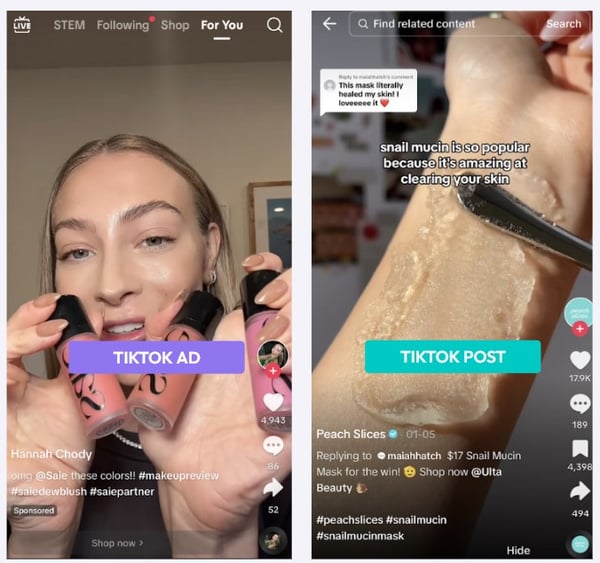
Selfies storytimes. In-store product reviews. Off-the-cuff tutorials and life hacks.
All of the above are fair game are effective in terms of TikTok ad formats.
Branded content should resemble the genuine, trendy videos you see on the platform daily. Again, advertisers note a performance boost by moving away from "polished" ad creatives.
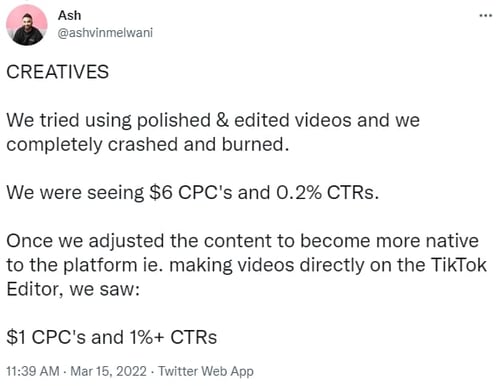
Source: Twitter
Brands often struggle with organic social reach and engagement. TikTok is no exception.
On the flip side, recent data confirms that "small" creators earn the most TikTok engagement.
Getting your brand directly in front of tens of thousands of relevant TikTokers is easier than you might think. This is especially true if you collab with TikTok micro-influencers or run Spark Ads.
Why? Because established creators know exactly how to show off products in action.
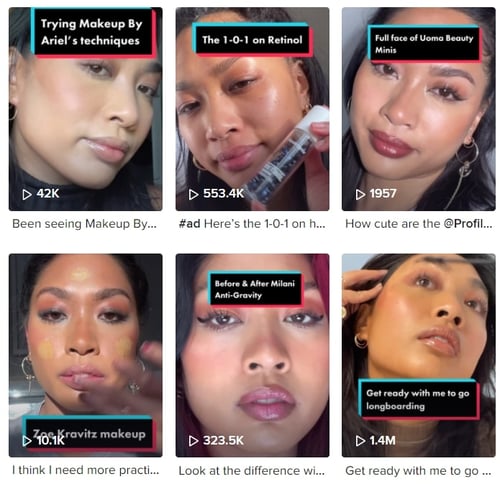
Source: @sarah_novio
This results in viral, high-engagement ads that promote your product in a meaningful way.
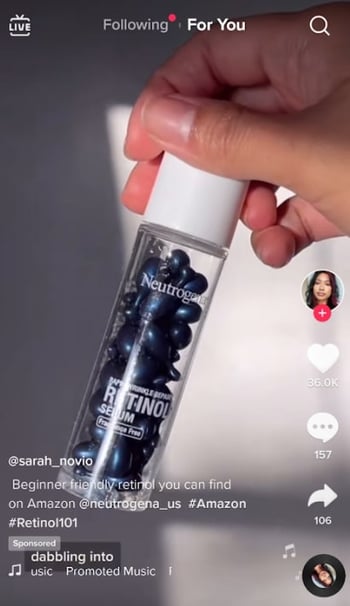
Source: @sarah_novio
After all, the TikTok algorithm tends to favor posts with consistent engagement. By running ads that earn interactions, you can boost your exposure through TikTok influencer content.
We've seen firsthand how brands are crushing it with TikTok advertising.
Of course, paid social campaigns are far from foolproof. Below are the potential downsides of paid TikTok campaigns, especially for brands running TikTok ads for the first time.
The scroll-heavy nature of the platform makes its ad presentation both a blessing and a curse.
Recent research notes just how many consumers go out of their way to avoid ads.
As noted earlier, TikTok ads are a seamless part of scrolling through the app. Swiping away is second nature unless your ad grabs viewers ASAP (hint: videos featuring people can help).
The effectiveness of TikTok advertising largely depends on your videos' hooks. This is why TikTok recommends ads with "early impact" within the first two seconds of a video.
From pricing to privacy issues, Meta’s ad network has plagued marketers for years.
So, is TikTok the cost-effective advertising alternative people have been begging for?
Depends on who you ask.
Pricing is a barrier to entry for any social ad platform. Likewise, one of the big disadvantages of advertising on TikTok is rising costs.
Sure, TikTok ads are typically less expensive than sponsored content on Facebook or Instagram.
The posts below are a sort of time capsule of how TikTok budgets have changed over the years.
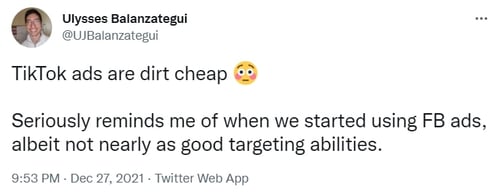
Source: Twitter
Of course, factors such as your audience and industry will ultimately determine how much you’re paying for a TikTok campaign. As the platform booms in popularity and its ad network proves itself, paid posts aren’t going to get any cheaper.
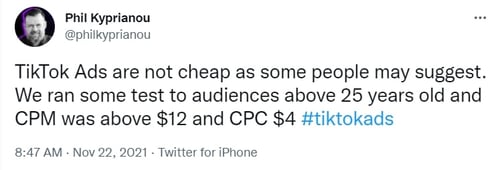
Source: Twitter
For reference, TikTok ads require a daily budget of $50 USD (and $20 per ad group).
If your goal is conversions, note that TikTok recommends an upfront investment to determine how to best serve your ads. The platform refers to this process as the “learning phase.” Ads need to reach at least 50 conversions before they “pass” the test.
Does this break the bank versus other social ads? Not at all. This price tag still represents a barrier to entry for smaller, up-and-coming brands that want to test the waters. For brands that have ample TikTok ad creatives, though, this represents a window of opportunity.
Let's be real: running social ads is never a passive process. TikTok is no exception.
TikTok can require advertisers to be very hands-on in producing and updating ad creatives. This echoes recent advice by Meta that speaks to how creatives make or break social ads.
Even after you vet your ads internally and pass TikTok’s learning phase, optimizing your campaign isn't over. You still need to cycle out, test and optimize your creatives. That means producing fresh content, writing new captions and managing even more resources.
You can see how TikTok advertising can eat into your schedule if you aren’t careful.
That said, the exception to all of the above is if you're running Spark Ads!
TikTok themselves note that Spark Ads result in higher ROAS, greater ad engagement and conversion rates. Also, the setup process for Spark Ads is super simple. All you need is an ad code and your campaign's creatives are already taken care of.
Here’s the deal: Investing in any ad platform is a commitment.
And it’s a commitment that you need to justify given the time and legwork involved.
There’s no shortage of TikTok advertising success stories out there. Building awareness and driving product sales are totally possible for brands big and small.
We’ve seen firsthand how brands and creators go viral and drive sales via short-form videos. With the launch of our instant TikTok Spark Ads feature, we've found a way to make the ad creation process even more seamless.
But the question of whether TikTok ads are effective for your brand depends on a few factors.
Here are the key questions to consider as you weigh the pros and cons of TikTok advertising:
From fashion and fitness to food beauty, TikTok is dominated by CPG brands.
These industries are prime for TikTok ads because these products are easy to showcase in videos. For example, makeup or food can seamlessly be presented as organic content via unboxings, how-tos and reviews. These are the types of branded posts that tend to go viral.
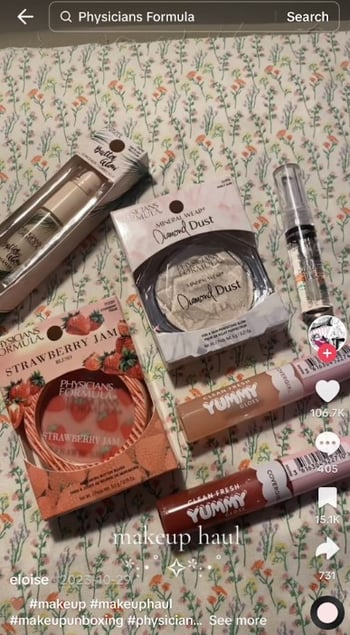
If you have a physical product that creators can show off on camera, chances are you're golden.
For brands that already work with influencers on TikTok, paid ads are a natural next step.
Remember: creator content is already the basis for the best TikTok ads. As noted in our UGC advertising panel, both experts and TikTok themselves recommend cycling a high volume of ad creatives at once (think: dozens of ads, not just a handful).
That's the upside for brands that do TikTok influencer collaborations at scale.
Your TikTok ads are already produced! Bonus points if you take those creatives and turn them into Spark Ads. This instantly eliminates back-and-forth and time spent tweaking ad creatives.
This might seem like a no-brainer, right?
TikTok is the network of choice for Gen Z and younger consumers at large. If your target audience has spending power on the platform, testing the waters of advertising on TikTok makes sense. This is especially true if you've succeeded with social ads elsewhere.
That said, creatives that work across Instagram or TikTok don't always translate to great TikTok ads. TikTok consistently notes that videos created specifically for the app vastly outperform repurposed videos both organically and for paid T ad campaigns.
This is the big one! The minimum $50 daily budget provides an opportunity to test the platform but may be difficult for smaller brands to scale.
Also, remember what we said earlier about needing to constantly cycle out creative? This is a huge investment if you don't already have rights-ready influencer content on hand.
From brand awareness to sign-ups and sales, it’s crucial to tie your TikTok ad campaigns to actual business outcomes. Ideally, you should already be promoting products on TikTok before diving into paid campaigns.
If you can establish an engaged presence organically, running ads is a natural next step.
Food for thought: 67% of TikTokers say the platform inspires them to shop (even when they weren't looking to).
This signals a huge window of opportunity for brands to attract shoppers organically or even without paid campaigns. While we've had brands see massive results with influencer content via Spark Ads, consider that paid campaigns aren't the only way to advertise on TikTok.
To wrap things up, let’s look at TikTok advertising strategies that don’t require you to run ads.
There are plenty of effective TikTok campaign ideas for brands that don't involve ad spend.
This includes:
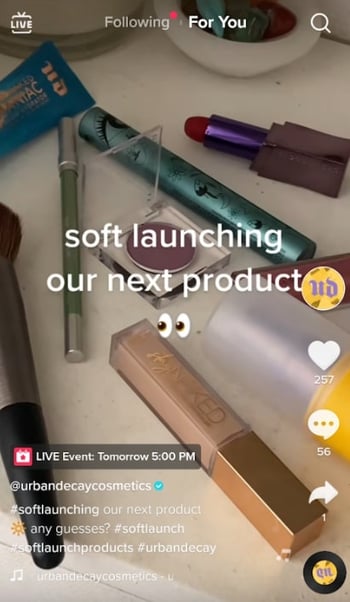
Source: @urbandecaycosmetics
The idea here is simple! Curate customer content that shows off your products in action.
As noted earlier, TikTok content from everyday creators is what tends to pop off. Your own customers are likewise the best and most creative when it comes to highlighting your products.
To set your TikTok account up to get more user-generated content to republish, consider:
That said, encouraging and sourcing customer content is tough when you’re not totally established on TikTok. But that actually leads us to our last point!
We'll say it again: not all advertising on TikTok has to happen through traditional paid ads.
And as we said earlier, creators go hand in hand with higher ad engagement.
More interactions. Longer watch times. Greater awareness.
There’s a reason why the best brands on TikTok put creators front and center. Creator-based campaigns provide a meaningful way to present your products to new customers.
By default, growing creators are already up-to-date on the latest trends and tactics that drive engagement. Those high engagement rates translate into more eyes on your products.
Product seeding is a proven way to get products into the hands of creators for valuable word-of-mouth. Influencers' audiences adore these sorts of posts and the level of engagement they earn speaks for themselves.
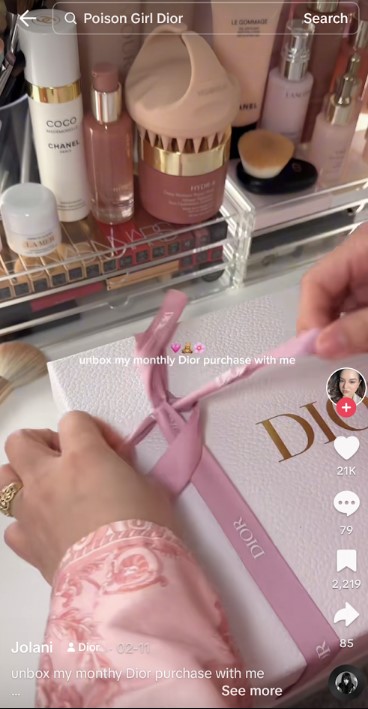
This represents the next-level creative content brands can earn fromTikTokers. For brands that want the best of both worlds, combining influencer campaigns with TikTok whitelisting and Spark Ads is the play. Especially when posts like unboxings and PR hauls perform so well organically.
If you’re eager to grow your TikTok presence, paid campaigns may seem like the way to go.
Pros and cons of TikTok advertising aside, just note that traditional ad campaigns aren’t the be-all, end-all of expanding your reach.
Again, TikTok creators are prime for engagement given their authenticity and ability to show off products in action. For brands that want to bring their products to life beyond flat lays and slideshows, TikTok influencers can make it happen.
The key is to partner with TikTok creators at scale. The more people that post about you, the more content you have to run via Spark Ads. Likewise, a high volume of posts about your brand can boost your TikTok SEO and help your brand rank for relevant terms.
If you help with all of the above, Statusphere's micro-influencer marketing platform can help.
Our software matches brands with vetted creators from our network using 250+ first-party data points. Beyond matching you with relevant TikTok influencers, we also make a cinch to run TikTok ads featuring your creators' content.
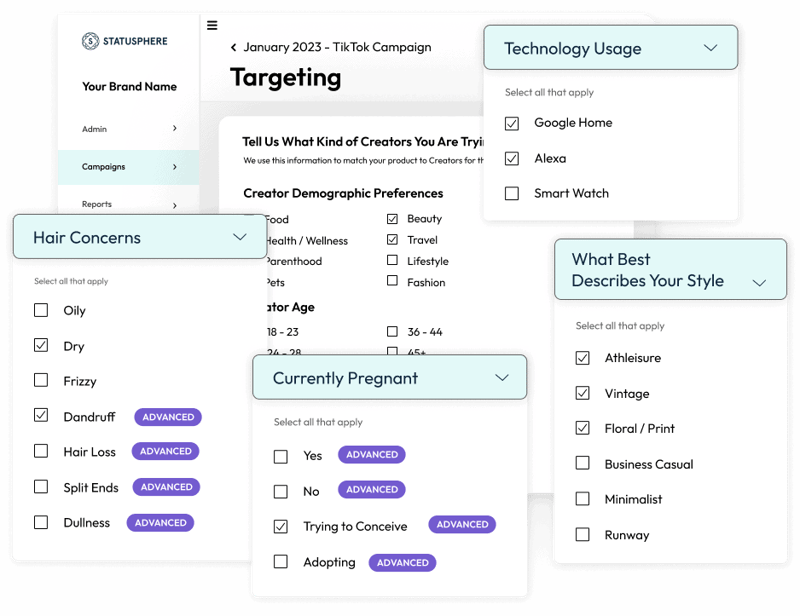
And since our creators' content has content rights baked in, you can use the posts you earn in your TikTok ads without negotiating or playing the waiting game.
We've already generated over 75,000+ pieces of authentic content on behalf of 400+ brands.
Want to learn more about how our software works? Get in touch with one of our experts to learn how Statusphere can save you 98% of the time you'd spend scaling creator campaigns yourself.
This article was first published in October 2020. It was last updated August 10, 2024.
Definitely, especially for the right brands!
TikTok ads are ideal for brands with eye-catching products that are easy to film and ship to creators.
With features like Spark Ads, you can turn regular posts into ads that blend right into users' feeds. This helps boost engagement and brand awareness without feeling too "salesy." The key to success is creating content that aligns with TikTok's vibe. Brands also need to be ready to invest in ongoing campaigns.
Success varies and there's no one-size-fits-all answer here.
But TikTok ads, especially Spark Ads using creator content, often perform really well! Especially compared to non-creator ads.
These ads tend to get more engagement and better conversion rates. We've had brands run Spark Ads featuring Statusphere creators which see 6x the engagement of their former campaigns.
The trick is to make your ads feel native to the platform—content that looks and feels like a regular TikTok video usually sees the best results.
Advantages of TikTok Ads
Disadvantages of TikTok Ads
Depends on your goals. We've seen brands succeed with both!
TikTok is great for reaching younger audiences with creative, informal content. Spark Ads let you seamlessly mix paid and organic content, often leading to high engagement.
On the other hand, Instagram is better for polished visuals and offers more detailed targeting options.
The "best" choice depends on where your audience hangs out and what kind of content you create.

What do the best TikTok Spark Ads have in common? Below we share seven Spark Ad examples highlighting how TikTok UGC translates into awesome brand...
From boosting organic reach to scaling Spark Ads, brands are all-in on TikTok UGC. We dig into the benefits of TikTok using user-generated content...
Which types of TikTok ads are best for your brand? Get to know the different TikTok ad formats and which is the best for nailing your paid campaign...
Be the first to know about the latest tools, trends and strategies in influencer marketing for brands.